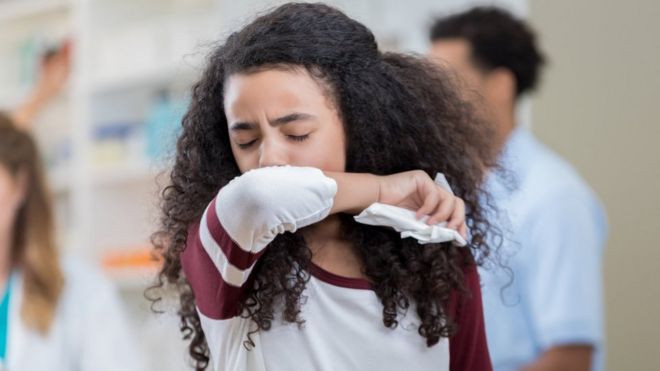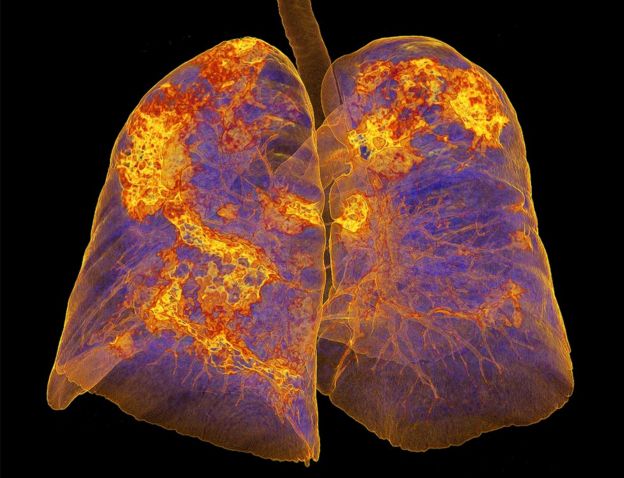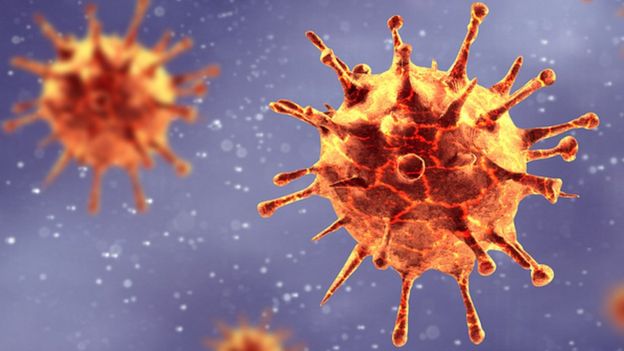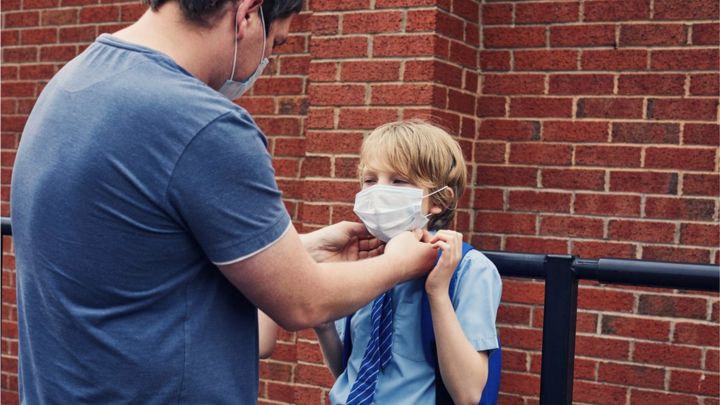Can transplant patients have the Covid vaccine? And other questions
- Published
The University of Oxford coronavirus vaccine is highly effective at stopping people developing Covid-19 symptoms, a large trial shows.
Here are some of your questions about the vaccine, and other related topics.
Questions and answers
Vaccine safety
Your questions
Skip Vaccine safety-
Is the Oxford vaccine suitable for people whose immune systems are not strong, such as transplant recipients? From Carol Olley, Newcastle
 Michelle Roberts Health online editor
Michelle Roberts Health online editorIf your immune system is suppressed and not working as well as it might, some "live" vaccines are not recommended. This is because the weakened virus they are made from could cause problems.
The Oxford vaccine is not a "live" vaccine. Scientists are testing which patients could benefit from it and whether this might include people with certain health conditions, or who are taking particular medication or undergoing treatment for something else, such as cancer or HIV.
There are lots of different Covid vaccines in development and some may be more suitable for different groups than others.
-
Is the Oxford AstraZeneca vaccine any safer or more traditional than Pfizer and Moderna’s vaccines? From Tom Haslam, Leicester
-
How do we know whether the Moderna vaccine is safe to use? From Emmanuelle Hurault
 Michelle Roberts Health online editor
Michelle Roberts Health online editorThis new Moderna vaccine, like the Pfizer/BioNTech one, is still being tested in advanced clinical trials.
The data so far looks very promising, but we still need to wait for the full results of the phase three studies to be sure that both vaccines are as good as they seem to be.
Regulators will only approve them for use if the data shows they are safe and effective enough.
-
Is it safe for someone who has recovered from Covid to have the vaccine? From Debra Fletcher
 Michelle Roberts Health online editor
Michelle Roberts Health online editorIf a coronavirus vaccine is approved for widespread use, it is likely that people will still be offered the jab even if they have had Covid-19 in the past. That’s because natural immunity may not be long-lived and immunisation could offer more protection.
More studies and data are needed before any of the many coronavirus vaccines in development can be approved.
The Pfizer trial only included volunteers who had not caught Covid before, so the results do not provide information on vaccinating people previously exposed to the pandemic virus.
-
Can the vaccine cause harm to a pregnant woman and their unborn child? From Jenny, Derbyshire
 Michelle Roberts Health online editor
Michelle Roberts Health online editorA vaccine will only be approved for use if regulators are satisfied that it is safe. Should a vaccine become available, it is not clear whether pregnant women would be offered it.
There is no evidence that pregnant women are more likely to get seriously ill from coronavirus, but they are included in the "clinically vulnerable" list as a precaution.
Some vaccines, such as the flu jab, are recommended during pregnancy.
-
How do you know the vaccine is safe to give to sick and elderly and those in care homes? From Carrie Wells
 Michelle Roberts Health online editor
Michelle Roberts Health online editorScientists around the world have been working at record speed to find a vaccine that can protect people against Covid-19. Although the research is being fast-tracked, safety is crucial.
No vaccine will be approved unless regulators are satisfied that it is safe as well as effective. Clinical trials involving thousands of volunteers are used to check this.
Even after a vaccine is approved, safety is continuously monitored. Any treatment can have some side effects in some people – vaccines are no different. Scientists and medics assess the possible risks against benefits of any treatment or intervention.
-
My husband is allergic to eggs and cannot have a flu jab because they use egg to culture the vaccine. Is it the same with COVID-19 vaccines? From Yvone, Albury
 Michelle Roberts Health online editor
Michelle Roberts Health online editorThe Covid vaccines that could soon be approved for use – the Pfizer jab, the Moderna one and the Oxford/Astrazeneca vaccine – are not made using eggs so there should be no issue for people with egg allergies.
The Oxford vaccine
Your questions
Skip The Oxford vaccine-
Will the Oxford vaccine provide lifetime immunity from coronavirus or will we need annual vaccinations? From Jamie McLaughlin, Scotland
 Michelle Roberts Health online editor
Michelle Roberts Health online editorWe don’t yet know how long immunity from the vaccine might last.
It is possible that people might need yearly vaccinations, a bit like for flu.
-
Is there any point taking the Oxford vaccine as it is not effective enough? From A Frost
 Michelle Roberts Health online editor
Michelle Roberts Health online editorNo vaccine is 100% effective for everyone. And 70% is still very good, particularly for a disease as serious as Covid-19.
US regulators had said they would accept 50% protection as worth pursuing for Covid. Flu jabs are between 40% and 60% effective.
-
If someone getting the Oxford vaccine is in the 30% non-effectiveness group, how will they know that it has not worked for them? From Paul Nightingale, Northampton
 Michelle Roberts Health online editor
Michelle Roberts Health online editorWhen you go for any type of jab there is no guarantee that it will give you complete protection.
But with a vaccine that has been shown to be 70% or more effective, there is a good chance that you will get at least some protection.
Encouragingly, none of the 11,000 who received the jab needed hospital treatment for Covid-19, even though a minority of them did still catch the virus.
-
What was the age distribution of volunteers given the Oxford vaccine? From Caroline Povey, Wales
-
Will I be able to choose which vaccine I receive? From Sarah, Oadby
 Michelle Roberts Health online editor
Michelle Roberts Health online editorThe first step is getting a vaccine approved.
If more than one gets the green light from regulators, then the priority will be getting doses out to the people who need it the most, as quickly as possible.
These steps will determine which vaccines are available first and can be offered to patients. It is unlikely that people will be able to pick and choose.
More questions about the vaccine
Your questions
Skip More questions about the vaccine-
Does the Moderna vaccine have storage and distribution constraints similar to the Pfizer vaccine? From Colin Hayes
 Michelle Roberts Health online editor
Michelle Roberts Health online editorBoth vaccines need to be stored at below freezing temperatures when they are transported from the factory out to clinics.
The Pfizer jab needs to be kept at around -70C, which is somewhat challenging, while the Moderna one can be kept in a normal freezer temperature of -20C.
Both can be thawed and kept in a fridge once they arrive at the clinic, but the Pfizer one then has a short shelf life of five days compared to four weeks for the Moderna vaccine.
-
If the vaccine is successful and vaccination begins, how will I know if the people around me in a public place have been vaccinated? From David Rowe, Crawley
 Michelle Roberts Health online editor
Michelle Roberts Health online editorInitially, only a small proportion of society will be offered a vaccine. The first stocks reaching the UK will be offered to those who need protecting from coronavirus the most in terms of disease severity – the elderly living in care homes and the health staff who work there.
Medical notes will say if an individual has been given the vaccine, but these are private records. There is no suggestion yet that people will need to carry proof of immunisation.
-
What the is the difference between a recovery with a small chance of reinfection, and a vaccine that is only 90% effective? From Clark, Kidderminster
 Michelle Roberts Health online editor
Michelle Roberts Health online editorPeople can get immunity to coronavirus either naturally – when they have been infected – or via a vaccine.
A vaccine that is 90% effective means that most people (nine in every 10) who are immunised will get some protection against the disease.
The big question is how long does this protection last? Scientists do not know the answer, either for natural immunity or vaccine-induced immunity.
-
I have been waiting for two months for a skin cancer biopsy. Will the Covid 19 vaccination programme mean I wait longer? From Bill Singleton, Bristol
 Michelle Roberts Health online editor
Michelle Roberts Health online editorThe NHS has been planning how best to roll out the vaccine once one becomes available. It will be a large-scale immunisation programme, requiring lots of trained staff to administer the jabs.
Pharmacists, nurses, doctors and other healthcare professionals will be able to vaccinate people in a range of settings – including care homes, hospitals and GP clinics as well as pop-up centres, such as sports stadiums and conference buildings.
It could mean some delays to some non-Covid NHS services, but urgent and essential care will be prioritised. The aim is to keep usual services running whenever possible. You could contact your GP to discuss any concerns you have.
-
When prioritising the oldest first for vaccination, would it be possible to treat couples based on the age of the elder of the couple? From Steve, Stockport
-
Will this vaccine prevent the spread of the virus? Do any of the vaccines in development do this? From Brian Grimshaw, Preston
 Michelle Roberts Health online editor
Michelle Roberts Health online editorIt is too soon to tell if any of the coronavirus vaccines that are currently being developed will be able to stop people from spreading the virus to others.
Some might reduce the severity of disease, rather than prevent infection.
-
Will the vaccine be compulsory? From Pat Bixley, Bristol
 Michelle Roberts Health online editor
Michelle Roberts Health online editorNo. It will be optional and offered first to those who could benefit the most, such as the elderly and healthcare workers.
England’s Health Secretary Matt Hancock has confirmed: “We are not proposing to make this compulsory – not least because I think the vast majority of people are going to want to have it.”
If it becomes available, children will not routinely be offered it, because they are low risk.
-
Whilst the vaccine will not be mandatory, is it possible that establishments could make proof of vaccination a condition of entry? From Will Ho, London
-
What is the logic behind the order in which the Covid vaccine will be rolled out? From Claire Elliott
 Michelle Roberts Health online editor
Michelle Roberts Health online editorIf regulators agree that the vaccine is safe and effective, then doctors, nurses and pharmacists can start giving it to people.
Those with the greatest clinical need will be offered it first, as long as it has been shown that the vaccine works well enough in this high-risk group. Age is the biggest risk factor for severe Covid, which is why older people will be put at the front of the queue for a vaccine.
The UK’s independent advisory committee on immunisation – the JCVI – has drafted a provisional priority list. At the top are elderly people living in care homes, along with the staff who look after them.
Next are people aged 80 and over, along with other health and social care workers. People over 65 or with underlying health conditions will then follow.
The ranking then moves down the age brackets to eventually include everyone over the age of 50 as more stock becomes available.
The priority list could change if Covid vaccine trial findings show particular jabs are more effective for certain groups or populations.
-
Given that the Pfizer/BioNtech vaccine needs to be stored in ultra-low temperature, would there be any major logistical challenges in that respect? From Jack
 Michelle Roberts Health online editor
Michelle Roberts Health online editorThe ingredients in the Pfizer/BioNtech vaccine are not very stable and need to be kept at below -70C until before use.
That means it must be transported carefully. But it must be thawed before it is given to a patient and Pfizer says the jab remains viable for up to five days kept in a normal fridge before it is administered.
-
Will the new vaccine protect against mink-mutated Covid? From Daemon Griffiths
 Michelle Roberts Health online editor
Michelle Roberts Health online editorExperts have recently discovered mutations in the genetic code of coronavirus that appear to have happened when mink caught the disease from humans and then passed it back to people.
Scientists are studying these alterations to see if they have significantly changed the behaviour and threat of the virus to mankind. So far, there is no evidence that the mutations pose an increased danger to people or that they will undermine the effectiveness of any Covid-19 vaccines.
All viruses mutate to some extent over time. Some changes can make a virus less lethal or contagious. Flu – a different virus to Covid – changes frequently, which is why the annual flu vaccine changes too, to keep pace.
-
What does 90% effective mean? Does it protect 90% of population or make infection less severe for all? From John Rowlinson, Lincoln
 Michelle Roberts Health online editor
Michelle Roberts Health online editorDrug company Pfizer has announced preliminary results from its ongoing vaccine trial. Experts need to wait to see the full results to know exactly who the vaccine will protect best and whether it could stop people spreading the infection even if they do not have symptoms.
The interim findings from the Pfizer trial suggest 90% or nine in every 10 people who get the vaccine will have protection against catching and getting symptomatic coronavirus seven days after a second dose of the jab (with the first dose given three weeks before the second one).
The finding is based on tests in 43,500 people – half who received the real jab and the other half who received a dummy or placebo vaccine containing only salt water.
During the trial, 94 of the 43,500 volunteers developed Covid symptoms and tested positive for the virus. Almost all of these were people who received the placebo vaccine.
The winter lockdown
Your questions
Skip The winter lockdown-
Can dependent university students from Wales come to visit their parents in England if they feel homesick and need support? From Keka, Sutton Coldfield
-
I have a confirmed flight on 1 December to Brisbane via Singapore. I am a permanent Australian resident trying to get home. Am I allowed to fly? From Helen Nesbit, Southsea, Hampshire
-
I commute between two hospitals in the week (essential worker), and stay at a colleague's because of distance. Is this OK as there is no hospital housing? From Dave, Oxford
-
I live in England, less than 500m from the Welsh border. My nearest supermarket is in Wales, as is my place of work - can I go? From Victoria, Chester
The new English lockdown restrictions will not prevent you doing either of these things. You are allowed to travel for work, if you cannot work from home, and you are allowed to travel to your local supermarket.
Wales is currently under a “firebreak” lockdown until 9 November, and during this period, travel into Wales is limited to essential journeys only. However, this includes travelling for work and to acquire necessities such as food, so you are allowed to cross the border for both these purposes.
Travel in and out of Wales will still be restricted after the firebreak ends, but you should still be able to travel for work and to buy food.
-
I look after an elderly couple’s garden - both of them are disabled and cannot do it themselves. Am I allowed to continue to do this? From H Ranscombe, Reading
-
I live alone - can I walk with one friend one day and another friend on a different day? Neither friend is in my bubble. From Stella Williams, Guilden Sutton, Cheshire
Yes. Any one person can meet any other one person in a public outdoor space for the purpose of exercise and recreation.
There is no limit to how many different people you can meet on successive days - or even on the same day. However, you cannot meet people in a private garden, unless you live with them or have formed a support bubble with them.
Children under five, as well as disabled people dependent on round-the-clock care, are not counted towards the limit on two people meeting outside.
-
Can I drive my car, or use public transport, to get to an outdoor location for purposes of exercise? From Tim Sanders, Norwich
Up to a point.
The government says you should avoid travelling in or out of your local area, and you should look to reduce the number of journeys you make. But it says you may “travel to exercise, if you need to make a short journey to do so”.
It says that you are encouraged to walk or cycle where possible, and to try to avoid busy times and routes on public transport.
-
Are the support bubbles for child care continuing? Can grandparents continue to look after their grandchild once a week? From Daniel Gould, East Grinstead
Yes. Informal childcare bubbles can carry on during the lockdown period.
Grandparents can still look after their grandchildren as long as they are aged 13 or under.
However, all people aged over 70 are considered to be “clinically vulnerable”, whether or not they have any underlying health conditions, and are advised to take extra precautions in terms of washing their hands and thoroughly cleaning frequently touched areas.
-
I'm helping my son finish the build of his house. Just the two of us. I normally stay a night. Can I still help him? Can I still stay over? From John, Wokingham
Unless you have already formed a household support bubble with your son, you will not be able to stay overnight in his house during the lockdown period.
Overnight stays away from your primary residence are not allowed unless they are for work or education, or for other specific circumstances such as moving house or attending a funeral.
If you are not already in a support bubble with your son, and you are not working on the house in a professional capacity, you will not be able to continue helping him during this period if you both need to be inside the house.
-
I have an eye test and exam booked for 17 November. Will I still be able to have it? From Michael Smith, Harrogate, North Yorks
Yes, you should be able to attend your appointment.
Opticians and other businesses providing medical services, including dentists, are allowed to remain open during the lockdown.
However, it would be worth reconfirming the details with your optician in case they have made any changes to appointments which may affect you.
As with any shop, you should wear a mask while you are inside the premises and should maintain social distancing from staff wherever possible.
-
I live in Cheshire and I have a viewing for a property in Sussex, where we are moving to, on Friday. Am I still allowed to go? Marisa Giles, Altrincham, Cheshire
-
I am going to my mother's funeral on Thursday. A small gathering/wake has been arranged for after with some food. Can this still go ahead? From Peter Bourn, Bournemouth
-
Are dentists still open during the second lockdown? From Andrew Sadler, Ipswich
Yes - unlike the first lockdown.
The government's guidance states that “a number of public services will also stay open and you will be able to leave home to visit them”. It has been confirmed by the Chief Dental Officer for England that this includes dentists. Practices are expected to continue operating under the restrictions which have been in place since they began to reopen during the summer.
-
I have a small baby (under six months), can I meet up for a socially distanced buggy walk in a park with a friend? From Cara, Cambridge
-
Will I be able to run my pilates class in a village hall or church hall? We are all socially distanced in class – two metres away from each other. From Mair Kennedy, Birkenhead
-
Can shops selling non essential goods (e.g. paint and other DIY goods) do so by click-and-collect plus a social distancing system? From John Cooper, Broad Green
-
As a domestic cleaner of private houses of mainly old people, am I still allowed to go to work to clean their houses? From Philip Wilkinson, Bedfordshire
-
My next door neighbour's family live in Yorkshire and Crewe. Will it be possible for us to be her bubble when we go on lockdown because she won't be able to visit her family? From Barbara
Support bubbles are still in place during the new lockdown. Anyone who lives alone can join up with one other household, which can be of any number of people. It's advised that you form a bubble with someone who lives nearby to avoid unnecessary travel.
Bubbles can also be formed with another household if a single adult lives with children who were under the age of 18 on 12 June 2020. And if someone shares custody of their child or children with someone they do not live with, they can have a bubble with the child's other parent in addition to their chosen support bubble.
So, as long as your neighbour lives alone or with children under 18 and is not already in a bubble, other than for shared custody purposes, the answer is yes.
-
Will hotels close through the lockdown? From Gary
Hotels, and other types of guest accommodation, are only going to be open for people who have to travel for work purposes.
There are going to be a "limited number of other exemptions" set in law, the government has said.
Also, if you were planning a holiday rather than a business trip, you should bear in mind that the new rules state "you should avoid all non-essential travel by private or public transport".
-
With the new lockdown, are hairdressers and mobile hairdressers allowed to still work? From Jenny
The government has said that certain businesses will have to close during the lockdown, with only those offering what are deemed essential services staying open.
Those having to shut include what it called "personal care facilities", which are places like hairdressers and barbers, beauty and nail salons and spas. That was also the case during the first lockdown earlier this year.
In addition, mixing of households indoors is only allowed for very limited purposes - like childcare or providing other care - which would mean a mobile hairdresser could not visit your home.
-
I am booked to move house on Friday. London to North Yorkshire. I have booked a van to do so. Can I still proceed? From Mark
Housing Secretary Robert Jenrick has said that people will still be able to move house, whether they are renting or buying. Removal firms and estate agents can also carry on working but must follow Covid safety guidance.
-
Will gyms and places of worship be closed? From Tom, London
Places of worship will not be open for normal services.
They will however stay open for funerals, individual prayer, for broadcasts of acts of worship, formal childcare, voluntary and public services like blood donation or food banks, or for some support groups.
All indoor and outdoor leisure facilities - including gyms, leisure centres and swimming pools - will have to shut.
People are being encouraged to exercise outside during the lockdown, in places such as local parks.
-
Are we getting mortgage breaks again from the banks? From Karen, Harlow
Mortgage payment holidays are being extended for homeowners financially affected by the pandemic.
Borrowers who have not yet had a mortgage holiday can request from their lender a pause in repayments, and that can last up to six months.
Those who have had their payments deferred already can extend their mortgage holiday until they reach the six-month limit.
The NHS Covid tracing app
Your questions
Skip The NHS Covid tracing app-
Currently the NHS tracing app requires IOS13.5 or above to install, so it is not compatible with older phones. Is there a workaround? From Taraka
-
My wife and I currently live apart until I retire. I live in Cumbria, she lives in Fort William. Which tracing app should I use? From Nick Jowett, Burgh-on-Sands, Cumbria
-
I have a bar and restaurant and I have just watched BBC news report on the new NHS app and QR code. Where do we obtain the QR code? From Steve Capewell, St Columb, Cornwall
-
I have hearing aids which are connected to my smartphone via Bluetooth, will this affect the operation of the app? From Richard Smith, Milton Keynes
All about coronavirus
Your questions
Skip All about coronavirus-
What is the coronavirus? from Caitlin in Leeds Most asked
-
Once you've had coronavirus will you then be immune? from Denise Mitchell in Bicester Most asked
-
What is the incubation period for the coronavirus? from Gillian Gibs
 Michelle Roberts Health online editor
Michelle Roberts Health online editorScientists have said that the “incubation period” - the time between catching the virus and starting to show symptoms - is five days on average. However, some people can have symptoms earlier or much later than this.

The World Health Organization advises that the incubation period can last up to 14 days. But some researchers say it may be up to 24 days.
Knowing and understanding the incubation period is very important. It allows doctors and health authorities to introduce more effective ways to control the spread of the virus.
-
Is coronavirus more infectious than flu? from Merry Fitzpatrick in Sydney
 Michelle Roberts Health online editor
Michelle Roberts Health online editorBoth viruses are highly contagious.
On average, it's thought people with the coronavirus infect two to three other people, while those with flu pass it on to about one other person.
There are simple steps you can take to stop the spread of flu and coronavirus:
- Wash your hands often with soap and water
If you have returned from holiday abroad and have to self-isolate in quarantine, you will not automatically qualify for Statutory Sick Pay (SSP), so it's possible you might have to make arrangements with your employer if you cannot work from home.
- Catch coughs and sneezes in a tissue and then put it in the bin
-
How long can you be ill? from Nita in Maidstone
-
Asymptomatic people are regarded as "silent spreaders" - what proportion of the population are they estimated to be and how do you find them? From Val Holland in Worcester
-
Why are diabetics not included in the clinically extremely vulnerable patients, and will the list be refreshed? from Derek Roberts in Hornchurch, Essex
-
How dangerous is coronavirus for people with asthma? from Lesley-Anne in Falkirk
 Michelle Roberts Health online editor
Michelle Roberts Health online editorAsthma UK's advice is to keep taking your daily preventer inhaler (usually brown) as prescribed. This will help cut the risk of an asthma attack being triggered by any respiratory virus, including coronavirus.
Carry your blue reliever inhaler with you every day, in case you feel your asthma symptoms flaring up. If your asthma is getting worse and there is a risk you might have coronavirus, contact the online NHS 111 coronavirus service.
-
Are otherwise healthy disabled people more at risk from coronavirus? from Abigail Ireland in Stockport
 BBC News Health team
BBC News Health teamCoronavirus can be more severe in older people and those with pre-existing conditions such as heart and lung illnesses, or diabetes.
There is no evidence that disabled people who are otherwise healthy - and who don't, for instance, have respiratory problems - are at greater risk from coronavirus.
-
Will people who've have had pneumonia experience milder coronavirus symptoms? from Marje in Montreal
 BBC News Health team
BBC News Health teamCovid-19 can, in a small number of cases, lead to pneumonia, most notably in people with pre-existing lung conditions.
But as this is a new virus, no-one will have any immunity to it, whether they have previously had pneumonia, or any other form of coronavirus such as Sars.

-
With key workers wearing some sort of mask, how are deaf people who lip-read supposed to understand what is being said? From Margaret Roll in Clevedon
Wearing masks presents major challenges for some deaf people who rely on lip-reading to communicate, but who also need to stay safe from catching the virus, especially if in a hospital setting.
The charity Action on Hearing Loss says there are some clinically approved see-through covered face masks that help enable lip-reading. However, they do not provide enough protection against aerosols spread by coronavirus, and wouldn’t be right for health and social care workers to use during this pandemic.
Many of the experimental coronavirus jabs currently being tested contain the genetic instructions for the surface spike protein that coronavirus uses to attach to and infect human cells. Reassuringly, scientists have not seen any substantial mutations to this part of the virus yet that would render these vaccines useless.

Protecting myself and others
Your questions
Skip Protecting myself and others-
What should I do if someone I live with is self-isolating? from Graham Wright in London
 BBC News Health team
BBC News Health teamIf you’re living with someone who’s self-isolating, you should keep all contact to a minimum and, if possible, not be in the same room together.
The person self-isolating should stay in a well-ventilated room with a window that can be opened, and keep away from other people in the house.
If you live with someone who has symptoms, you'll also need to self-isolate for 14 days from the day their symptoms started - this is how long it can take for symptoms to appear.
If you get symptoms, self-isolate for 10 days from when your symptoms start, even if it means you're self-isolating for longer than 14 days. If you do not get symptoms, you can stop self-isolating after 14 days.
-
Should people stop having sex? from Martha Menschel in Las Vegas
If you live with your partner, they count as being part of your household. If neither of you is showing coronavirus symptoms and you are already in close contact, having sex won't increase the likelihood of you catching the virus from one another. If one person does have symptoms, they should be self-isolating in a separate room.
Using contraception such as condoms won't alter your risk of catching the virus, as having sex will bring you into close physical contact anyway.
"If you are going to touch each other's genitals it's likely that you will potentially be kissing at the same time - and we know the virus is passed through saliva," Dr Alex George told the BBC's Newsbeat.
"Essentially, any possibility of transfer of coronavirus - from your mouth to your hands, to genitals, to someone else's nose or mouth - increases the risk of passing on coronavirus."
Me and my family
Your questions
Skip Me and my family-
My mother is 71 and recently bereaved and emotionally very vulnerable. Can I visit her in Denbighshire from West Cheshire? From Andrea Kearney
-
I work Saturdays and sometimes Sundays. Can my parents or my sister still come to my house to look after my children? From Michelle in Brent, London
-
My in-laws have health problems and are about to have work started in their house. We can't form a support bubble with them as there are two of them and four of us, but can they visit our house during the work? From Andy Corbett
-
I am five months pregnant and want to understand the risk to the baby if I get infected? from a BBC website reader
 James Gallagher Health correspondent
James Gallagher Health correspondentPregnant women are being advised by the UK government to stay at home and keep contact with others to a minimum. However, they should attend antenatal clinics as normal.
There is no evidence to suggest that pregnant women are more likely to get coronavirus. But, for a small number of women, being pregnant may change the way their body deals with a severe viral infection.
The government’s chief medical adviser says this is a precautionary measure until scientists find out more about the virus and that "infections and pregnancy are not a good combination in general”.
-
I am breastfeeding my five-month-old baby - what should I do if I get coronavirus? from Maeve McGoldrick
 James Gallagher Health correspondent
James Gallagher Health correspondentMothers pass on protection from infection to their babies through their breast milk.
If your body is producing antibodies to fight the infection, these would be passed on through breastfeeding.
Breastfeeding mums should follow the same advice as anyone else over reducing risk - cover your mouth when you sneeze and cough, throw away used tissues straight away and wash hands frequently, while trying to avoid touching your eyes, nose or mouth with unwashed hands.
-
Is it possible to catch coronavirus from a pet dog or cat? from Javed
-
What is the risk to children? from Louise in London
 BBC News Health team
BBC News Health teamIn general, children appear to be relatively unaffected by coronavirus, according to data from China and other countries.
This may be because they are able to shake off the infection or have no symptoms or only very mild ones similar to a cold.
However, children with underlying lung problems, such as asthma, may have to be more careful.
Work issues
Your questions
Skip Work issues-
I'm self-employed. Can I claim benefits if I can't work due to the virus? from Mark Gribby in Nottingham
 Simon Gompertz Personal finance correspondent
Simon Gompertz Personal finance correspondentSelf-employed people who have symptoms or have been told to self-isolate may apply for two benefits - universal credit or employment and support allowance.
Normally, you would be eligible after four days of being ill. However, the government has responded to the spread of coronavirus by saying that companies will temporarily pay SSP from the first day off.
But charities are worried that there is still a five-week delay before universal credit is paid.
-
Who is eligible for universal credit? from Mario in London
-
If you have to self-isolate will you only get statutory sick pay, or will your employer pay your salary? from Laura White in Herefordshire
-
What are my chances of getting a job in lockdown/when lockdown is over? from Jess in Essex
Quarantine
Your questions
Skip Quarantine-
Can I travel to Ireland and then onto another country, then back to the UK via Ireland to avoid the quarantine? from Chris McCann in Sandhurst
-
Do key workers have to quarantine? From Mateusz in London
-
Will my flatmates have to quarantine as well because of me? From Matteo in London
Unless your flatmates were travelling with you, they do not need to self-isolate or quarantine with you.
However, you must avoid contact with them and minimise the time you spend in shared spaces like kitchens, bathrooms and sitting areas.
You should stay in a well-ventilated room with a window to the outside that can be opened, separate from your flatmates, and if you can, you should use a separate bathroom from them. If you do need to share these facilities, regular cleaning will be required after each person has used them.
Make sure you use separate towels from the other people in your house, both for bathing and showering, and for washing your hands.
-
If I have to quarantine after a holiday and can’t work from home will I get paid? From Emma in Portishead, Bristol
Not necessarily.
If you have returned from holiday abroad and have to self-isolate in quarantine, you will not automatically qualify for Statutory Sick Pay (SSP), so it's possible you might have to take the extra time off as annual leave, or else as unpaid leave.
The Department of Work and Pensions says that anyone planning to travel should do so in the knowledge that they will be required to self-isolate on their return.
It adds that employers and staff should discuss and agree any arrangements in advance, and urges employers to take socially responsible decisions.
Meanwhile, the Foreign & Commonwealth Office is still advising UK nationals against taking all but essential international travel.
Support bubbles
Your questions
Skip Support bubbles-
When will people be allowed to resume physical contact with a loved one in a bubble scenario? from Sue in Chester
-
Can I have my grandson overnight? I am a single grandparent living on the ground floor in my own house, however I have a lodger who lives on the second floor. from Teresa
Back to school
Your questions
Skip Back to school-
Is it a good idea to send kids back to school if they have a heart problem? from Zoe Corran in Bangor
-
Would it be a good idea for random Covid testing to take place in schools? from Deanna
-
If repeatedly touching a mask can render it ineffectual and more likely to transfer infection, how will this work with school children taking masks on and off during the school day? from June
Schools have been issued guidance on how to ensure face coverings are removed safely.
Pupils are to be instructed by staff not to touch the front of their face covering during use or when removing it.

They are also encouraged to wash or sanitise their hands after removing masks.
If pupils have disposable masks, they should put them in a covered bin or if they have reusable masks they should be stored in a plastic bag until they are reused.
What do I need to know about the coronavirus?
What questions do you have about coronavirus? Do you want to ask it on BBC News? Get in touch and we may ask you to send us a video of you asking your question.
In some cases, your question will be published, displaying your name, age and location as you provide it, unless you state otherwise. Your contact details will never be published. Please ensure you have read our terms & conditions and privacy policy.
Use this form to ask your question:
If you are reading this and can't see the form above you will need to visit the mobile version of the BBC website to submit your question or send them via email to YourQuestions@bbc.co.uk. Please include your name, age and location with any question you send in.
Related Topics
- Published
- 19 hours ago
- Published
- 4 days ago
- Published
- 1 hour ago